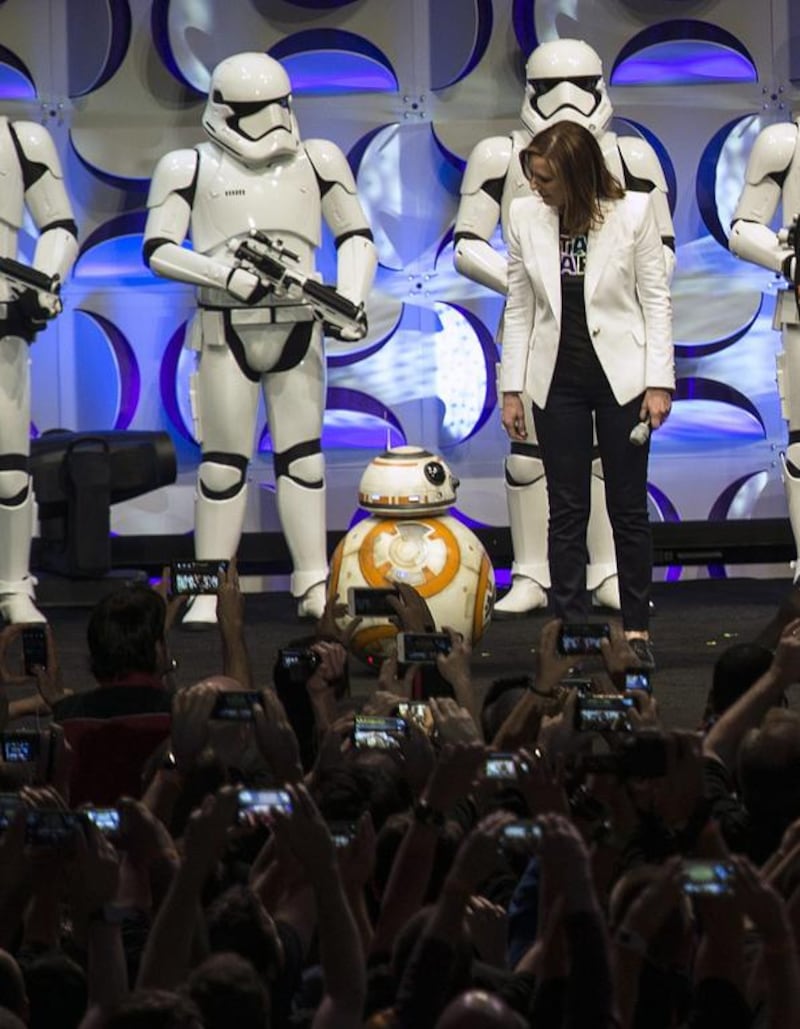If it weren't for someone willing to entertain a new idea, the new Star Wars droid, BB-8, wouldn't be rolling into living rooms in time for Christmas.
The robot – which looks like a mechanical head on a spinning ball – was the brainchild of the filmmakers behind Star Wars Episode VII: The Force Awakens, who were unaware that their puppetry-animated character could work in real life.
But in July last year, Bob Iger, the chief executive of Lucasfilm’s parent company, Disney, showed secret images of BB-8 to a start-up company called Sphero. It was one of the inaugural class of companies Disney brought into a three-month programme intended to nurture their entrepreneurial spirit and maybe generate a moneymaking product.
It was like Force lightning hitting pay dirt. Sphero’s founders built a functioning prototype that very night, an innovation that now sits in the company’s headquarters in Boulder, Colorado.
“Imagine sitting down with Bob Iger and him pointing to something the whole world wants to know about,” said Sphero chief executive Paul Berberian. “And you get to see something that you’ve been working on. What a magical stroke of luck.”
Disney’s “accelerator” is the kind of programme that is being adopted by big companies such as Microsoft, Barclays, Nike and Volkswagen. The idea is to invest a small amount in a handful of start-ups, mentor them, and launch them on a trajectory towards additional funding, product development and, possibly, business deals.
Disney now plans to give the BB-8 toy made by Sphero a big push in September, before the movie, which was partly filmed in Abu Dhabi, opens in December. It also took a minority stake in Sphero, which has raised US $81 million (Dh297.5m) so far.
Kevin Mayer, Disney’s chief strategy officer, says the accelerator programme is less about a quick profit and more about dreaming up innovative products and injecting Disney’s upper management with energy and ideas.
“There’s a different form of excitement that you get when you have new people whose company is on the line and it’s a make-or-break moment for them,” Mayer said. “All the executives who came in and mentored – to a person – enjoyed it tremendously and came out feeling more energised than they went in.”
The secret to success? Corporations must “give first” – in other words, be free with their time, advice and contacts without an expected return, says David Cohen, chief executive of TechStars, which administers 18 accelerators, half of which are linked to major corporations.
Seeking an immediate benefit through an exclusive distributor relationship or a guarantee of a future equity stake at a predetermined price can limit good ideas and turn away potential applicants on the cusp of trying to broaden their market reach.
“That’s what corporate America is still learning,” Cohen said. “Once [corporations] are helpful, in turn, [the start-ups] are probably happy to have them invest more or buy the company.”
Already funded with about $30m before joining Disney’s accelerator, Sphero didn’t need the $120,000 investment that all participants are awarded. Instead, it was looking to tap into Disney’s storytelling expertise to humanise its toy and gain access to Disney’s senior-management team.
The relationship helped open the door to Sphero becoming the licensed maker of the BB-8 toy, get distribution agreements with major retailers and polish its in-store presence.
Accelerators are becoming an increasing source of innovation for major companies. Microsoft has run 410 companies through its accelerator programme since 2012. Not all of them work out .
Hal Gregersen, executive director of the MIT Leadership Center, says embracing new ideas can be difficult for large organisations, especially those focused on results, execution and improving profits from existing business lines.
“New ideas will never be nurtured for success by results-driven executives who either don’t know how to innovate themselves, or truly don’t honour others who do,” he said. “Because most of these ideas are long leaps of faith.”
This year’s class of 10 start-ups has already taken up residence at the Disney space. During a recent visit, the start-ups’ bosses introduced themselves and their projects as Mayer asked questions.
MakieLab, the maker of custom-made dolls created using 3-D printers, was looking to explore pairing its technology with Disney characters. Mayer thought out loud about teaming up MakieLab with a graduate of last year’s class, Tyffon, which adapted its zombifying photo app for Disney characters.
“If you could mesh that with a 3-D printer and have the whole thing come out in a 3-D doll, now we’re talking,” Mayer said.
Tan Le, chief executive of Emotiv, said she hoped her brainwave-reading headset might follow in Sphero’s footsteps. Software developers have proven they can use the headset to direct self-driving cars. Other applications include helping disabled people guide wheelchairs.
Le was well aware her device imparts upon its wearer powers eerily reminiscent of the Force from Star Wars.
"The opportunity to embed a product into the Star Wars franchise is enormous," she said. "We think our relationship with Disney can be a real game changer for us as well."
* AP





